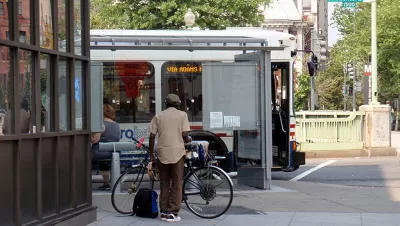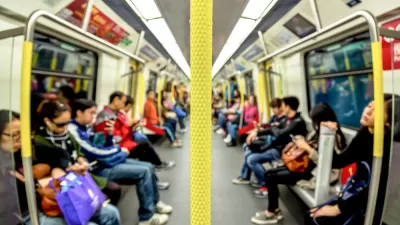A plan to prioritize equity would, according to regional planners, increase access to jobs and resources, reduce emissions, and improve public health.

D.C. officials "are considering whether to prioritize historically underserved areas with high concentrations of minority and low-income residents when deciding where to target affordable housing, transportation investments and other improvements," reports Katherine Shaver. According to regional planners, "[c]ompleting the half-finished National Capital Trail Network, they say, would help more people reach transit-accessible jobs, while reducing traffic congestion and greenhouse gas emissions."
If the plan is approved, "equity would be at the forefront of decisions affecting public health, housing, economic development, job growth and climate change" in addition to transportation. "D.C. Council member Charles Allen (D), the Transportation Planning Board’s chair, said the approach would address the 'east-west divide' that stems from the western part of the region having more jobs and the eastern part having less expensive housing and longer commutes."
"Under the proposal, local governments would focus development around the region’s 150 'high-capacity transit' stations, along with another 75 expected to be built by 2030. That would use the land more efficiently, planners say, because transit stations occupy just 10 percent of the region’s land."
The Metropolitan Washington Council of Governments board will vote on the proposal on October 13. "Separately — but in line with the proposed equity-based approach — the planning board on Wednesday approved its first grants for preliminary design or engineering on local projects that would make it easier and safer to walk or bike to major transit stations."
FULL STORY: D.C.-area leaders consider prioritizing equity in transportation and land use planning

Planetizen Federal Action Tracker
A weekly monitor of how Trump’s orders and actions are impacting planners and planning in America.

Maui's Vacation Rental Debate Turns Ugly
Verbal attacks, misinformation campaigns and fistfights plague a high-stakes debate to convert thousands of vacation rentals into long-term housing.

Restaurant Patios Were a Pandemic Win — Why Were They so Hard to Keep?
Social distancing requirements and changes in travel patterns prompted cities to pilot new uses for street and sidewalk space. Then it got complicated.

In California Battle of Housing vs. Environment, Housing Just Won
A new state law significantly limits the power of CEQA, an environmental review law that served as a powerful tool for blocking new development.

Boulder Eliminates Parking Minimums Citywide
Officials estimate the cost of building a single underground parking space at up to $100,000.

Orange County, Florida Adopts Largest US “Sprawl Repair” Code
The ‘Orange Code’ seeks to rectify decades of sprawl-inducing, car-oriented development.
Urban Design for Planners 1: Software Tools
This six-course series explores essential urban design concepts using open source software and equips planners with the tools they need to participate fully in the urban design process.
Planning for Universal Design
Learn the tools for implementing Universal Design in planning regulations.
Heyer Gruel & Associates PA
JM Goldson LLC
Custer County Colorado
City of Camden Redevelopment Agency
City of Astoria
Transportation Research & Education Center (TREC) at Portland State University
Jefferson Parish Government
Camden Redevelopment Agency
City of Claremont





























